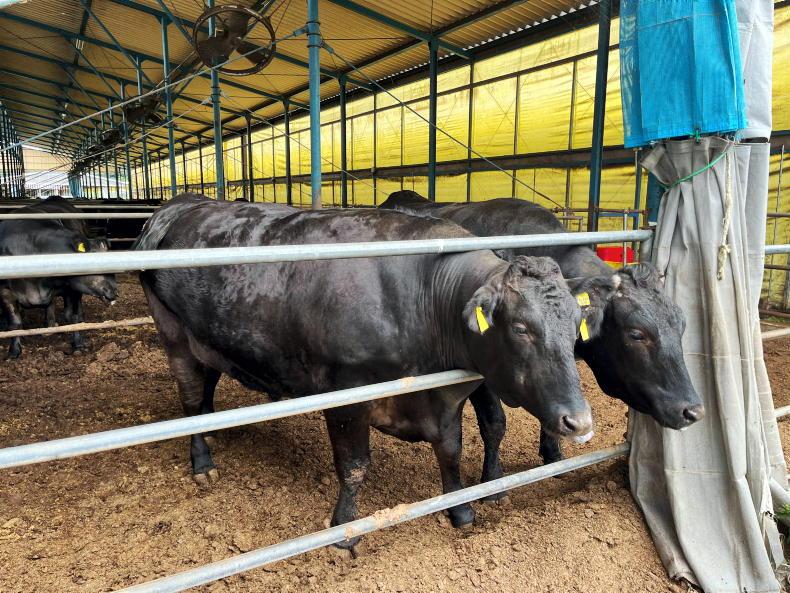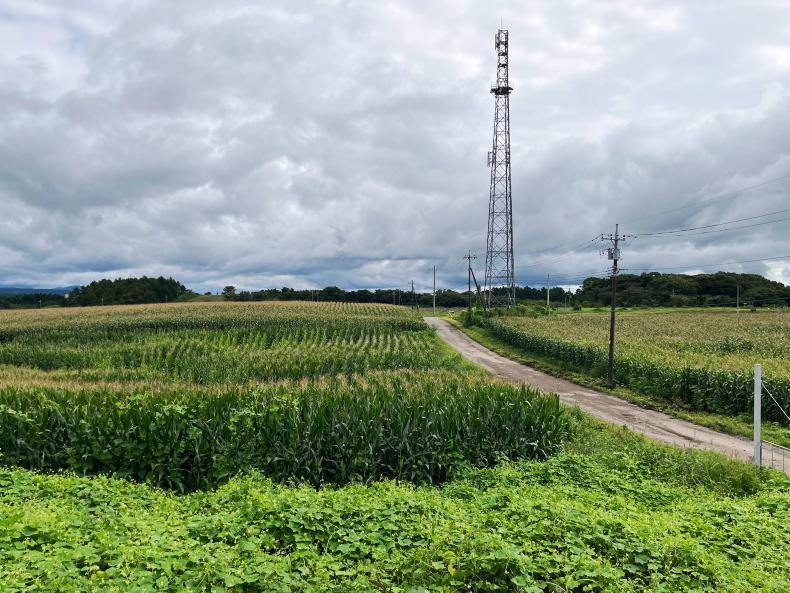A Wagyu beef farm outside Tokyo, Japan, is seeing some of its best 30-month-old steers making €15,000 at slaughter.
The operation - ‘Wealthy Farm’ - is owned by Hiroo Takeuchi and runs 900 head of Wagyu, including 300 breeding females, as well as a milking herd of 1,000 Holstein Friesian cows on 40ha.
The dairy herd is expanding, with a second farm under construction nearby, set to carry another 1,000 cows.

Farm owner Mr Hiroo Takeuchi and director of the Asahi Food Corporation, Japan, Mr Yoshiki Ueda.
The farm, visited by the Irish Farmers Journal on Friday last, runs all cattle indoors in a highly intensive feeding system.
Increasing Wagyu numbers
Wealthy Farm uses embryo transfer to increase the number of Wagyu calves it has born every year for rearing.
Currently, in the milking herd, 80 Holstein cows calve every month, with 30 of these delivering purebred Wagyu calves, 25 delivering purebred Holstein calves following the use of sexed semen and 25 delivering crossbred ‘F1’ Wagyu-sired calves.
All cows are served through AI, with no bulls - Wagyu or Holstein - present on the farm.

The pedigree Wagyu calves are weaned at three months.
The 'F1' calves are sold at one month old, with recent average prices hitting €700. Prices in previous years have been as high as €1,400 for these Wagyu-cross animals, but feed costs have led to decreased demand in recent months.
The Wagyu calves, known for their delicate nature at birth, are kept in a warm environment for their first few weeks.
Of the 300 Wagyu breeding females on the farm, 180 rear their own calf annually, with 120 used for regular flushing.

The Wagyu cows are long-lived, rearing calves until age15.
Every Saturday, several cows are flushed, with embryos inspected and graded by the farm’s breeding technician.
Each cow delivers approximately seven embryos per flushing.
Cows might first be flushed at two years of age, as heifers, and until they are 10 years of age, depending on breeding performance.
Wagyu cows rearing their own calves are long-lived, with many raising calves in their 15th year.
Taking advantage of the market
Wealthy Farm buys and sells its valuable Wagyu stock at various ages, depending on the market and their quality.
Some cattle are reared to 20 months at 550kg and then sold on for further feeding to other farms to finish.
Other cattle are fed on on-farm until they are 30 months old at 850kg or more and slaughtered.
The farm also buys in some 20-month-old cattle to add to its own numbers, if they are of value.
The farm aims to slaughter 12 30-month-old cattle a month or a total of 120 a year.
Wagyu cattle in Japan kill out at about 68%, with the desired carcase weight of 550kg and more fetching prices of €20/kg to €30/kg, depending on the beef’s marbling and quality.
The Irish Farmers Journal observed a steer which was ready to be killed, with farmer Takeuchi stating its value will be close to €15,000 (600kg kill-out at a price of €25/kg).

850kg-plus bullocks worth €15,000 on the Japanese Wagyu farm.
There were also a number of cull cows being intensively fed for slaughter on display. Takeuchi described how the Wagyu beef of these cows is of the same value of younger steers, no matter their age.
Feeding
The Wagyu cattle are fed various rations, with in-calf cows fed solely hay and animals nearing slaughter fed a high-protein, high-concentrate diet. These smaller-framed cattle, pushed to reach higher weights, are fed almost ad lib.

Maize is grown on Wealthy Farm on land not currently taken for sheds. The farm is 25% feed sufficient.
The farm produces maize and is 25% feed sufficient, with the majority of corn, hay and alfalfa imported, mostly from the US.
The farm owner was unable to provide detail on the volume of feed fed to a finished Wagyu steer in its lifetime or what this might cost.
Wealthy Farm employs 40 people as part of its 1,000-cow dairy operation and a further four to operate the Wagyu system.
The dairy herd is milked three times a day through a herringbone parlour, with average weekly milk yields of 30l.

All of the 1,000 dairy cows are Holstein Friesian.
Climate measures
On the farm’s environmental impact, farmer Takeuchi says the Japanese government has not yet directed them to reduce emissions or provided guidance on any environmental measures.
However, many farmers in the area have invested in solar panels, now regularly supplying to the national grid, adding to their farm income.

Hay is imported as small square bales.
The farm holds a permit from the Japanese government, which allows it to provide some of its manure to neighbouring farmers for use on crops. This can be given away for free or sold for a small price.
The remaining manure is fermented, making it sterile. It is then mixed with wood chip and reused as bedding for the cattle.
Read more
Irish Angus beef sells for €72/kg in Singapore
Watch: Wagyu weanlings make €4,000 at Japanese mart
A Wagyu beef farm outside Tokyo, Japan, is seeing some of its best 30-month-old steers making €15,000 at slaughter.
The operation - ‘Wealthy Farm’ - is owned by Hiroo Takeuchi and runs 900 head of Wagyu, including 300 breeding females, as well as a milking herd of 1,000 Holstein Friesian cows on 40ha.
The dairy herd is expanding, with a second farm under construction nearby, set to carry another 1,000 cows.

Farm owner Mr Hiroo Takeuchi and director of the Asahi Food Corporation, Japan, Mr Yoshiki Ueda.
The farm, visited by the Irish Farmers Journal on Friday last, runs all cattle indoors in a highly intensive feeding system.
Increasing Wagyu numbers
Wealthy Farm uses embryo transfer to increase the number of Wagyu calves it has born every year for rearing.
Currently, in the milking herd, 80 Holstein cows calve every month, with 30 of these delivering purebred Wagyu calves, 25 delivering purebred Holstein calves following the use of sexed semen and 25 delivering crossbred ‘F1’ Wagyu-sired calves.
All cows are served through AI, with no bulls - Wagyu or Holstein - present on the farm.

The pedigree Wagyu calves are weaned at three months.
The 'F1' calves are sold at one month old, with recent average prices hitting €700. Prices in previous years have been as high as €1,400 for these Wagyu-cross animals, but feed costs have led to decreased demand in recent months.
The Wagyu calves, known for their delicate nature at birth, are kept in a warm environment for their first few weeks.
Of the 300 Wagyu breeding females on the farm, 180 rear their own calf annually, with 120 used for regular flushing.

The Wagyu cows are long-lived, rearing calves until age15.
Every Saturday, several cows are flushed, with embryos inspected and graded by the farm’s breeding technician.
Each cow delivers approximately seven embryos per flushing.
Cows might first be flushed at two years of age, as heifers, and until they are 10 years of age, depending on breeding performance.
Wagyu cows rearing their own calves are long-lived, with many raising calves in their 15th year.
Taking advantage of the market
Wealthy Farm buys and sells its valuable Wagyu stock at various ages, depending on the market and their quality.
Some cattle are reared to 20 months at 550kg and then sold on for further feeding to other farms to finish.
Other cattle are fed on on-farm until they are 30 months old at 850kg or more and slaughtered.
The farm also buys in some 20-month-old cattle to add to its own numbers, if they are of value.
The farm aims to slaughter 12 30-month-old cattle a month or a total of 120 a year.
Wagyu cattle in Japan kill out at about 68%, with the desired carcase weight of 550kg and more fetching prices of €20/kg to €30/kg, depending on the beef’s marbling and quality.
The Irish Farmers Journal observed a steer which was ready to be killed, with farmer Takeuchi stating its value will be close to €15,000 (600kg kill-out at a price of €25/kg).

850kg-plus bullocks worth €15,000 on the Japanese Wagyu farm.
There were also a number of cull cows being intensively fed for slaughter on display. Takeuchi described how the Wagyu beef of these cows is of the same value of younger steers, no matter their age.
Feeding
The Wagyu cattle are fed various rations, with in-calf cows fed solely hay and animals nearing slaughter fed a high-protein, high-concentrate diet. These smaller-framed cattle, pushed to reach higher weights, are fed almost ad lib.

Maize is grown on Wealthy Farm on land not currently taken for sheds. The farm is 25% feed sufficient.
The farm produces maize and is 25% feed sufficient, with the majority of corn, hay and alfalfa imported, mostly from the US.
The farm owner was unable to provide detail on the volume of feed fed to a finished Wagyu steer in its lifetime or what this might cost.
Wealthy Farm employs 40 people as part of its 1,000-cow dairy operation and a further four to operate the Wagyu system.
The dairy herd is milked three times a day through a herringbone parlour, with average weekly milk yields of 30l.

All of the 1,000 dairy cows are Holstein Friesian.
Climate measures
On the farm’s environmental impact, farmer Takeuchi says the Japanese government has not yet directed them to reduce emissions or provided guidance on any environmental measures.
However, many farmers in the area have invested in solar panels, now regularly supplying to the national grid, adding to their farm income.

Hay is imported as small square bales.
The farm holds a permit from the Japanese government, which allows it to provide some of its manure to neighbouring farmers for use on crops. This can be given away for free or sold for a small price.
The remaining manure is fermented, making it sterile. It is then mixed with wood chip and reused as bedding for the cattle.
Read more
Irish Angus beef sells for €72/kg in Singapore
Watch: Wagyu weanlings make €4,000 at Japanese mart













 This is a subscriber-only article
This is a subscriber-only article









SHARING OPTIONS: